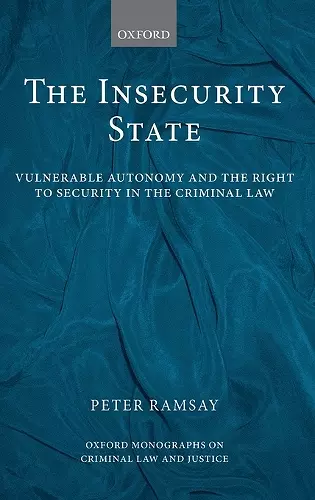The Insecurity State
Vulnerable Autonomy and the Right to Security in the Criminal Law
Format:Hardback
Publisher:Oxford University Press
Published:26th Apr '12
Currently unavailable, and unfortunately no date known when it will be back

The Insecurity State is a book about the recent emergence of a 'right to security' in the UK's criminal law. The Insecurity State sets out from a detailed analysis of the law of the Anti-Social Behaviour Order and of the Coalition government's proposed replacement for it. It shows that the liabilities contained in both seek to protect a 'freedom from fear'and that this 'right to security' explains a lot of other recently enacted criminal offences. This book identifies the normative source of this right to security in the idea of vulnerable autonomy. It demonstrates that the vulnerability of autonomy is an axiomatic assumption of political theories that have enjoyed a preponderant influence right across the political mainstream. It considers the influence of these normative commitments on the policy of both the New Labour and the Coalition governments. The Insecurity State then explores how the wider contemporary criminal law also institutionalizes the right to security, and how this differs from the law's earlier protection of security interests. It examines the right to security, and its attendant penal liabilities, in the context of both human rights protection and normative criminal law theories. Finally the book exposes the paradoxical claims about the state's authority that are entailed by penal laws that assume the vulnerability of the normal, representative citizen. The Insecurity State offers a criminal law theory that is unorthodox in both its method and its content: BLIt is focused on a contemporary development in the 'special part' of the criminal law rather than the law's general principles. BLIt is an explanatory political sociology of substantive criminal law rather than the more familiar normative theory; but it is an explanatory theory that seeks to understand the law's historical development through an investigation of the changing character of its normative order. BLIt does not apply a pre-existing sociological or philosophical theory to the law; rather it develops a theoretical explanation from detailed legal analysis and reconstruction of New Labour's penal laws. BLIt concludes that repressive criminal laws have arisen from a deficit of political authority rather than from excessive authoritarianism.
It is a rare pleasure to read a boko that displays proficiency in so many disciplinary languages. Ramsay engages with doctrinal scholarship, normative theory, criminology and political philosophy with equal enthusiasm and aplomb - whilst avoiding the worst excesses of each. The result is essential reading for anyone interested in the connections between criminal justice and security. * Andrew Cornford, The Modern Law Review *
This is not just an exceptionally useful and well-informed book about the changing nature of law in the UK, but it is more importantly an attempt to situate these developments in the changing nature of the state. * Stuart Waiton, International Journal of Law in Context *
ISBN: 9780199581061
Dimensions: 240mm x 163mm x 23mm
Weight: 582g
278 pages